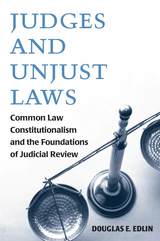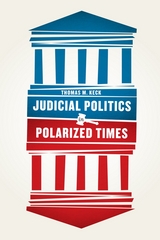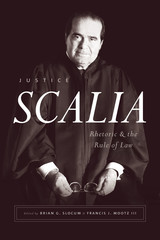281 books about Constitutional and 4
start with J
281 books about Constitutional and 4
281 books about Constitutional
4 start with J start with J
4 start with J start with J

Judges and Unjust Laws
Common Law Constitutionalism and the Foundations of Judicial Review
Douglas E. Edlin
University of Michigan Press, 2010
"A powerful historical, conceptual, and moral case for the proposition that judges on common law grounds should refuse to enforce unjust legislation. This is sure to be controversial in an age in which critics already excoriate judges for excessive activism when conducting constitutional judicial review. Edlin's challenge to conventional views is bold and compelling."
---Brian Z. Tamanaha, Chief Judge Benjamin N. Cardozo Professor of Law, St. John's University, and author of Law as a Means to an End: Threat to the Rule of Law
---Brian Z. Tamanaha, Chief Judge Benjamin N. Cardozo Professor of Law, St. John's University, and author of Law as a Means to an End: Threat to the Rule of Law
In Judges and Unjust Laws, Douglas Edlin uses case law analysis, legal theory, constitutional history, and political philosophy to examine the power of judicial review in the common law tradition. He finds that common law tradition gives judges a dual mandate: to apply the law and to develop it. There is no conflict between their official duty and their moral responsibility. Consequently, judges have the authority---perhaps even the obligation---to refuse to enforce laws that they determine unjust. As Edlin demonstrates, exploring the problems posed by unjust laws helps to illuminate the institutional role and responsibilities of common law judges.
Douglas E. Edlin is Associate Professor in the Department of Political Science at Dickinson College.
[more]

Judging under Uncertainty
An Institutional Theory of Legal Interpretation
Adrian Vermeule
Harvard University Press, 2006
How should judges, in America and elsewhere, interpret statutes and the Constitution? Previous work on these fundamental questions has typically started from abstract views about the nature of democracy or constitutionalism, or the nature of legal language, or the essence of the rule of law. From these conceptual premises, theorists typically deduce an ambitious role for judges, particularly in striking down statutes on constitutional grounds. In this book, Adrian Vermeule breaks new ground by rejecting both the conceptual approach and the judge-centered conclusions of older theorists. Vermeule shows that any approach to legal interpretation rests on institutional and empirical premises about the capacities of judges and the systemic effects of their rulings. Drawing upon a range of social science tools from political science, economics, decision theory, and other disciplines, he argues that legal interpretation is above all an exercise in decisionmaking under severe empirical uncertainty. In view of their limited information and competence, judges should adopt a restrictive, unambitious set of tools for interpreting statutory and constitutional provisions, deferring to administrative agencies where statutes are unclear and deferring to legislatures where constitutional language is unclear or states general aspirations.
[more]

Judicial Politics in Polarized Times
Thomas M. Keck
University of Chicago Press, 2014
When the Supreme Court upheld the Affordable Care Act, some saw the decision as a textbook example of neutral judicial decision making, noting that a Republican Chief Justice joined the Court’s Democratic appointees to uphold most provisions of the ACA. Others characterized the decision as the latest example of partisan justice and cited the actions of a bloc of the Court’s Republican appointees, who voted to strike down the statute in its entirety. Still others argued that the ACA’s fate ultimately hinged not on the Court but on the outcome of the 2012 election. These interpretations reflect larger stories about judicial politics that have emerged in polarized America. Are judges neutral legal umpires, unaccountable partisan activists, or political actors whose decisions conform to—rather than challenge—the democratic will?
Drawing on a sweeping survey of litigation on abortion, affirmative action, gay rights, and gun rights across the Clinton, Bush, and Obama eras, Thomas M. Keck argues that, while each of these stories captures part of the significance of judicial politics in polarized times, each is also misleading. Despite judges’ claims, actual legal decisions are not the politically neutral products of disembodied legal texts. But neither are judges “tyrants in robes,” undermining democratic values by imposing their own preferences. Just as often, judges and the public seem to be pushing in the same direction. As for the argument that the courts are powerless institutions, Keck shows that their decisions have profound political effects. And, while advocates on both the left and right engage constantly in litigation to achieve their ends, neither side has consistently won. Ultimately, Keck argues, judges respond not simply as umpires, activists, or political actors, but in light of distinctive judicial values and practices.
Drawing on a sweeping survey of litigation on abortion, affirmative action, gay rights, and gun rights across the Clinton, Bush, and Obama eras, Thomas M. Keck argues that, while each of these stories captures part of the significance of judicial politics in polarized times, each is also misleading. Despite judges’ claims, actual legal decisions are not the politically neutral products of disembodied legal texts. But neither are judges “tyrants in robes,” undermining democratic values by imposing their own preferences. Just as often, judges and the public seem to be pushing in the same direction. As for the argument that the courts are powerless institutions, Keck shows that their decisions have profound political effects. And, while advocates on both the left and right engage constantly in litigation to achieve their ends, neither side has consistently won. Ultimately, Keck argues, judges respond not simply as umpires, activists, or political actors, but in light of distinctive judicial values and practices.
[more]

Justice Scalia
Rhetoric and the Rule of Law
Edited by Brian G. Slocum and Francis J. Mootz III
University of Chicago Press, 2019
Justice Antonin Scalia (1936–2016) was the single most important figure in the emergence of the “new originalist” interpretation of the US Constitution, which sought to anchor the court’s interpretation of the Constitution to the ordinary meaning of the words at the time of drafting. For Scalia, the meaning of constitutional provisions and statutes was rigidly fixed by their original meanings with little concern for extratextual considerations. While some lauded his uncompromising principles, others argued that such a rigid view of the Constitution both denies and attempts to limit the discretion of judges in ways that damage and distort our system of law.
In this edited collection, leading scholars from law, political science, philosophy, rhetoric, and linguistics look at the ways Scalia framed and stated his arguments. Focusing on rhetorical strategies rather than the logic or validity of Scalia’s legal arguments, the contributors collectively reveal that Scalia enacted his rigidly conservative vision of the law through his rhetorical framing.
In this edited collection, leading scholars from law, political science, philosophy, rhetoric, and linguistics look at the ways Scalia framed and stated his arguments. Focusing on rhetorical strategies rather than the logic or validity of Scalia’s legal arguments, the contributors collectively reveal that Scalia enacted his rigidly conservative vision of the law through his rhetorical framing.
[more]
READERS
Browse our collection.
PUBLISHERS
See BiblioVault's publisher services.
STUDENT SERVICES
Files for college accessibility offices.
UChicago Accessibility Resources
home | accessibility | search | about | contact us
BiblioVault ® 2001 - 2024
The University of Chicago Press









